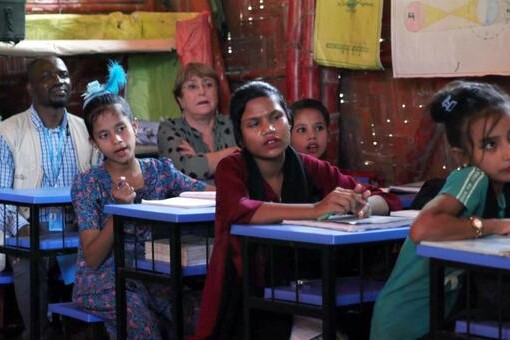The UN migration agency on Friday deplored the deaths of at least 20 migrants in the Libyan desert and renewed its call for stronger migrant protection along the Chad-Libya border.
“The death of twenty people in the Libyan desert yesterday is yet another wake-up call for the whole international community and a reminder that we are very far from achieving the goal of ‘leaving no one behind’, the mantra of the 2030 Agenda,” said Federico Soda, Chief of the International Organization for Migration’s (IOM) Mission in Libya.
‘Unacceptable and avoidable’
On 28 June, the bodies of 18 people believed to be Chadian, and two Libyans, were reportedly recovered near the border area between the two countries.
The continuing loss of life in the Mediterranean Sea and in the deserts of southern Libya are both unacceptable and avoidable.
IOM calls for stronger action to protect migrants following death of 20 people on Chad-Libyan border.https://t.co/kt25Ua50Ze
— IOM – UN Migration 🇺🇳 (@UNmigration) July 1, 2022
According to the Libyan Ambulance and Emergency Services, it’s believed they all died of dehydration.
“The loss of lives we are witnessing both in the Mediterranean Sea and in the deserts of southern Libya are both unacceptable and avoidable,” said Mr. Soda.
Lethal travel
The Sahara Desert is among the world’s most perilous and deadliest migration routes.
According to IOM’s Missing Migrants Project, more than 2,000 migrant deaths have been documented since 2014 in the Sahara Desert alone, but experts believe the numbers are higher.
“These tragedies must be a call to action to provide minimal standards of protection to migrants, enable search and rescue operations, reinforce humanitarian border management, and provide urgently required assistance in this extremely remote area,” said Anne Kathrin Schaefer, IOM Chad Chief of Mission
Gold mining-related fatalities
Since the intensification of gold mining in northern Chad in 2012, the Chad-Libya border area has seen an increase of incidents related to migrants being abandoned by traffickers and smugglers, or transporters getting lost.
And last month, clashes between gold miners in the town of Kouri Bougoudi, close to the border with Libya, left hundreds dead and displaced an estimated 10,000 mine workers in northern Chad.
“In the absence of safe migration pathways, migrants take risky roads, fall into the hands of traffickers, or get lost in the desert – with often devastating consequences,” Ms. Schaefer said.
Call for protection
Between January and March, more than 45,000 migrants were recorded at the Faya, Zouarké and Ounianga Kébir “Flow Monitoring Points” in Northern Chad.
Among the migrants surveyed by IOM during that period, 32 per cent were headed towards Libya – despite the lack of basic preconditions to ensure their safety and protection.
IOM reiterated its call to protect migrants and their rights through dedicated search and rescue efforts, and the investigation and prosecution of smugglers and traffickers who take advantage of people’s despair and vulnerability.




